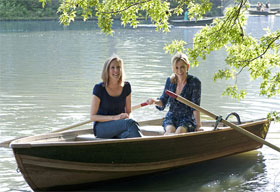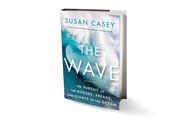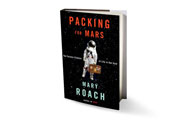
Roach (left) and Casey in the wilds of Central Park.
Two intrepid writers explain why science is so cool.
O's Editor in Chief, Susan Casey, is an admitted "ocean fanatic," a journalist whose work has taken her all over the globe, including into an enclave of great white sharks for the 2005 best-seller The Devil's Teeth. This month she comes out with The Wave, a spellbinding look into 100-foot-plus swells and the surfers and scientists who love them. Mary Roach is a kindred spirit, a writer who has gone to great extremes to report on the curious worlds of cadavers (Stiff), the paranormal (Spook), sex (Bonk), and now, outer space in the fascinating Packing for Mars. The two authors sat down to talk about their shared obsessions.Susan Casey: Why did you want to write about space?
Mary Roach: I've always been a bit of a space geek. I wrote an article years ago about the neutral buoyancy tank, which is this biblically sized pool where they train astronauts. And it was just the coolest thing. What made you want to write about giant waves?
SC: When I was learning to surf, I got seriously injured by a four-foot wave—ruptured a kidney, got my face all scraped up—and I could not believe the power of the thing. I was like a piece of lint being flipped around. Later, when I heard stories about 100-foot waves and surfers who wanted to ride them, and ships disappearing in them, I had to find out more.
MR: I think space and the ocean are both these weird-ass places that are so incredibly unexplored.
SC: Yes! This is the natural world—let's be curious about it. It's about being aware of what you see and hear, and questioning it: "What do you mean there are 100-foot waves taking out ships?"

MR: Exactly. I never understand this attitude that science is really boring. How can anyone say that?
SC: Science is where the most extraordinary stories are.
MR: Science is you! It's your head, it's your dog, it's your iPhone—it's the world. How do you see that as boring? If it's boring, it's because you're learning it from a textbook. I feel like you have to slip it in sideways so that people don't realize they're being taught science.
SC: And being genuinely excited helps. I find the ocean so endlessly fascinating that I'm compelled to tell people about it. Like, "Hey, look over here, it's a shark the size of a cube van!"
 MR: I know. You want to tell people: "Get off the Internet!"
MR: I know. You want to tell people: "Get off the Internet!"SC: Yeah, go outside for ten minutes. From the time I was a kid, I always wanted to know what was in water. I was fixated on looking at fish or crayfish or frogs. Not that I'm not interested in earth, too, but water just seemed so mysterious. Were you the kind of kid who was always asking why?
MR: Yeah! My mom was very religious and she'd read the Bible to me: "They played the horns of Jericho and the walls came tumbling down!" And I'd be like, "Really? Seriously? Do you think maybe there was an earthquake at the same time and that's what happened? How could a trumpet...well, what kind of a trumpet? Maybe there's some infrasound? Possibly? You'd need a lot of amplification—a lot of decibels—and maybe you could take out a wall." It drove my mother crazy.
SC: What part of your reporting for Mars was the most exciting?
MR: Weightlessness was unbelievable. It's physical euphoria: Nothing about you has any weight. You don't realize that you are weighed down all the time by yourself, and your organs, and your head. Your arms weigh down your shoulders. In space simulation, you get to fly like Superman! You're hanging in the air! It's the coolest thing. How about you?
SC: Going down the face of a 50-foot wave was my weightlessness moment.
MR: You don't have fear, right? You're just sort of in this religious experience?
SC: You can't be scared when you're entirely focused on the moment. You can't be thinking about what might happen in the next instant or what just happened. Fear is almost a luxury. Big-wave surfers feel more respect than fear. They're well aware of the power of what they're dealing with. The best people I met in that realm were the humblest. Because if you're in front of a 70-foot wave, you really can't think you're that important.
MR: I don't think I've seen a wave bigger than ten feet.
SC: The steepness floored me. You don't realize how vertical the really big ones are. What do you think makes somebody want to ride a 100-foot wave or go into space?
MR: It attracts a certain kind of driven, high-achieving personality. For space, the actual job itself pretty much sucks. There was one guy at NASA who gave me this wonderful description of what space is really like: You're exhausted, the food's crap, you can't open the window, you can't see your family, if you screw up you won't fly again, you can't go for a walk, the pay stinks. Can you get a worse job than that? But there is this aura associated with it that appeals to those sorts who want to get to the top.
SC: I loved the end of your book, when you talk about space exploration being a noble human endeavor, worthy of its expense. It's hard to feel like much we do these days is noble or questing. It's all about quarterly reports and making a lot of money quickly. Going to Mars would require using our collective imagination.
MR: Right. When someone tells me, "Oh, we have so many problems on Earth, space exploration costs too much money," I say, "I absolutely agree with you. But I still hope we do it."
Keep Reading:
MR: Weightlessness was unbelievable. It's physical euphoria: Nothing about you has any weight. You don't realize that you are weighed down all the time by yourself, and your organs, and your head. Your arms weigh down your shoulders. In space simulation, you get to fly like Superman! You're hanging in the air! It's the coolest thing. How about you?
SC: Going down the face of a 50-foot wave was my weightlessness moment.
MR: You don't have fear, right? You're just sort of in this religious experience?
SC: You can't be scared when you're entirely focused on the moment. You can't be thinking about what might happen in the next instant or what just happened. Fear is almost a luxury. Big-wave surfers feel more respect than fear. They're well aware of the power of what they're dealing with. The best people I met in that realm were the humblest. Because if you're in front of a 70-foot wave, you really can't think you're that important.
MR: I don't think I've seen a wave bigger than ten feet.
SC: The steepness floored me. You don't realize how vertical the really big ones are. What do you think makes somebody want to ride a 100-foot wave or go into space?
MR: It attracts a certain kind of driven, high-achieving personality. For space, the actual job itself pretty much sucks. There was one guy at NASA who gave me this wonderful description of what space is really like: You're exhausted, the food's crap, you can't open the window, you can't see your family, if you screw up you won't fly again, you can't go for a walk, the pay stinks. Can you get a worse job than that? But there is this aura associated with it that appeals to those sorts who want to get to the top.
SC: I loved the end of your book, when you talk about space exploration being a noble human endeavor, worthy of its expense. It's hard to feel like much we do these days is noble or questing. It's all about quarterly reports and making a lot of money quickly. Going to Mars would require using our collective imagination.
MR: Right. When someone tells me, "Oh, we have so many problems on Earth, space exploration costs too much money," I say, "I absolutely agree with you. But I still hope we do it."
Keep Reading:
Photo: Bobby Fisher




